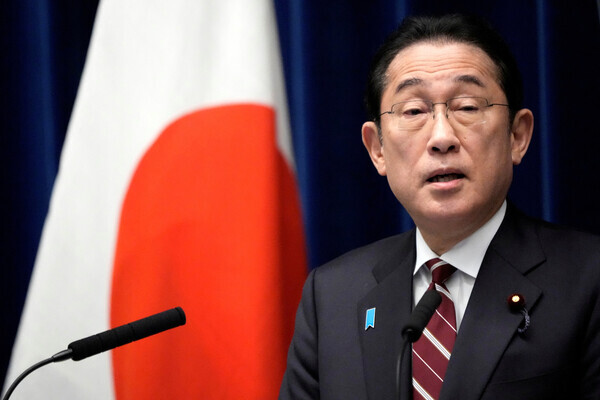hankyoreh
Links to other country sites 다른 나라 사이트 링크
After Pyongyang’s rebuff, Kishida reiterates intent to meet with Kim Jong-un

Japanese Prime Minister Fumio Kishida reaffirmed his intent to continue efforts to hold a summit with North Korea, saying that “a fruitful relationship between Japan and North Korea is aligned with the interests of both sides.”
During a press conference held in Tokyo on Thursday following the passage of Japan’s budget for the 2024 fiscal year, Kishida stated, “I still maintain that it will contribute significantly to peace and stability in the region,” in response to a question regarding the possibility of a North Korea-Japan summit.
“We will work to resolve a number of issues, but the issues need to be discussed with our counterparts,” Kishida said, adding, “I will continue to respond at a high level using my position as prime minister to advocate for the Japanese government’s basic policy. I strongly hope that we can move forward to resolve the abduction issue and other issues.”
On Monday, Kim Yo-jong, a senior official in the Workers’ Party of Korea and sister of Kim Jong-un, stated, “Shortly ago, Kishida, through another channel, conveyed his intention to personally meet the President of the State Affairs of the Democratic People's Republic of Korea as soon as possible.”
She also emphasized that the abduction issue is settled, stating that if Japan keeps “being engrossed in the abduction issue that has no further settlement and way to know, the prime minister cannot but meet a criticism that his design is little short of a bid for popularity.”
However, the following day, Kim declared that North Korea will “pay no attention to and reject any contact and negotiations with the Japanese side,” rejecting any and all attempts to go ahead with a bilateral summit.
As soon as it was made clear that Japan would not accept North Korea’s claims that the abduction issue has been resolved, North Korea announced that a summit between the two countries was not in North Korea’s interest.
Japan has frequently expressed its willingness to host a North Korea-Japan summit since the US-North Korea summit in June 2018, with then-Prime Minister Shinzo Abe stating that he was “willing to meet directly with North Korean leader Kim Jong-un.” But the two countries’ different views on North Korea’s nuclear program and missiles and the abduction issue have been a major roadblock to meeting for a summit.
The two countries’ views on the abduction issue have been at constant odds, with North Korea maintaining its position that the issue has been resolved ever since then-North Korean leader Kim Jong-il formally apologized and returned five surviving victims to Japan during then-Prime Minister Junichiro Koizumi’s visit to Pyongyang in September 2002, while Japan states that the issue is still on-going.
Unlike Abe, Kishida has been adding the clause, “responding at the prime minister’s level” now that the families of the abduction victims have aged significantly.
In March and May 2023, Japan’s Asahi Shimbun newspaper reported that Japanese government officials were in secret contact with North Korean Workers’ Party officials in Southeast Asia, citing several unnamed diplomatic sources.
In addition, the National Association for the Rescue of Japanese Kidnapped by North Korea, which supports the committee for families of Japanese abduction victims, announced a new campaign policy in February that it “does not oppose the lifting of Japan’s independent sanctions against North Korea” on the condition that all abductees are allowed to return home temporarily while the victims’ parents are still alive.
However, since the rift between North Korea’s claim that all surviving victims have been returned and Japan’s assertions that it cannot acknowledge North Korea’s claims are so deep, it looks like the gap between the two countries’ claims is too wide to be bridged.
By Cho Ki-weon, staff reporter
Please direct questions or comments to [english@hani.co.kr]

Editorial・opinion
![[Column] Season 2 of special prosecutor probe may be coming to Korea soon [Column] Season 2 of special prosecutor probe may be coming to Korea soon](https://flexible.img.hani.co.kr/flexible/normal/500/300/imgdb/original/2024/0426/3317141030699447.jpg) [Column] Season 2 of special prosecutor probe may be coming to Korea soon
[Column] Season 2 of special prosecutor probe may be coming to Korea soon![[Column] Park Geun-hye déjà vu in Yoon Suk-yeol [Column] Park Geun-hye déjà vu in Yoon Suk-yeol](https://flexible.img.hani.co.kr/flexible/normal/500/300/imgdb/original/2024/0424/651713945113788.jpg) [Column] Park Geun-hye déjà vu in Yoon Suk-yeol
[Column] Park Geun-hye déjà vu in Yoon Suk-yeol- [Editorial] New weight of N. Korea’s nuclear threats makes dialogue all the more urgent
- [Guest essay] The real reason Korea’s new right wants to dub Rhee a founding father
- [Column] ‘Choson’: Is it time we start referring to N. Korea in its own terms?
- [Editorial] Japan’s rewriting of history with Korea has gone too far
- [Column] The president’s questionable capacity for dialogue
- [Column] Are chaebol firms just pizza pies for families to divvy up as they please?
- [Column] Has Korea, too, crossed the Rubicon on China?
- [Correspondent’s column] In Japan’s alliance with US, echoes of its past alliances with UK
Most viewed articles
- 1‘We must say no’: Seoul defense chief on Korean, USFK involvement in hypothetical Taiwan crisis
- 2Division commander ordered troops to enter raging flood waters before Marine died, survivor says
- 3Is Japan about to snatch control of Line messenger from Korea’s Naver?
- 4[Column] Season 2 of special prosecutor probe may be coming to Korea soon
- 5[Editorial] Korea’s surprise Q1 growth requires objective assessment, not blind fanfare
- 6[Special report- Part III] Curses, verbal abuse, and impossible quotas
- 7Flying “new right” flag, Korea’s Yoon Suk-yeol charges toward ideological rule
- 8[Column] ‘Choson’: Is it time we start referring to N. Korea in its own terms?
- 9[Column] Park Geun-hye déjà vu in Yoon Suk-yeol
- 10Why Korea shouldn’t welcome Japan’s newly beefed up defense cooperation with US